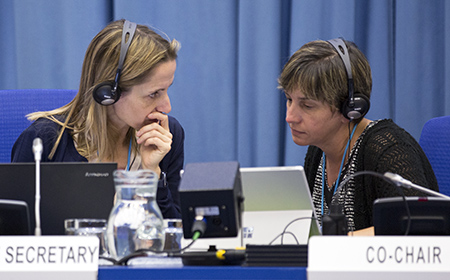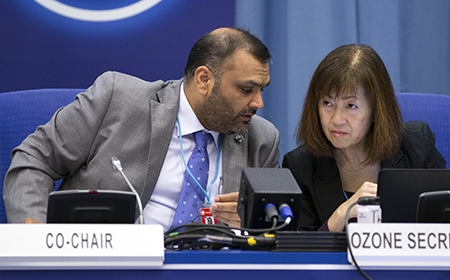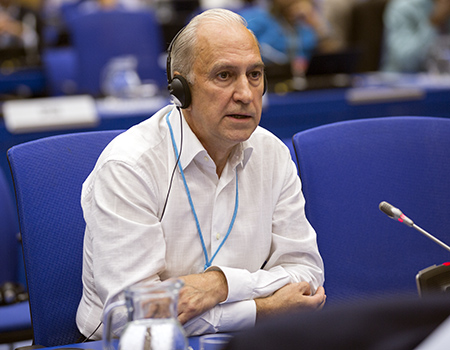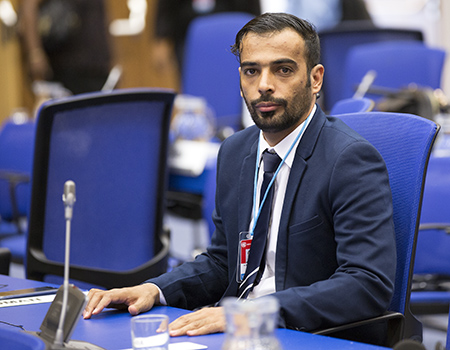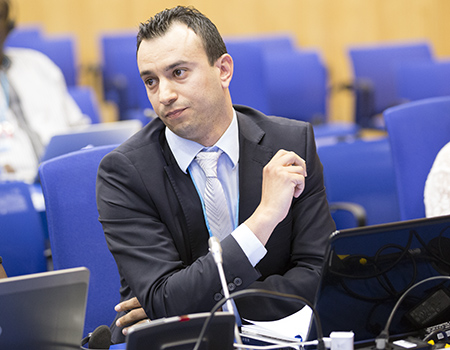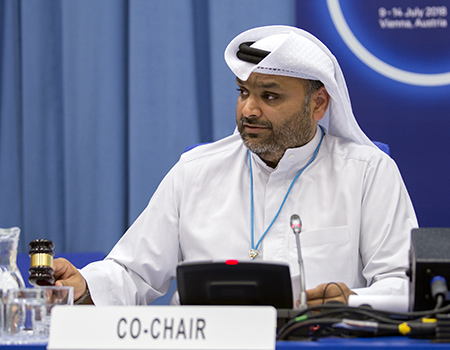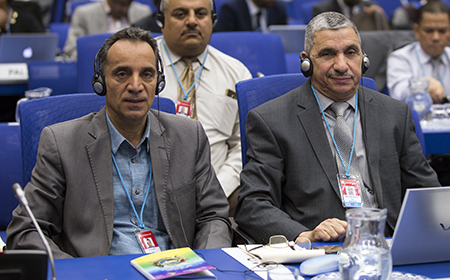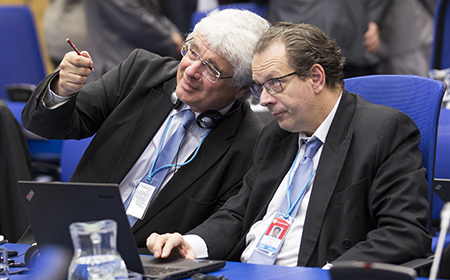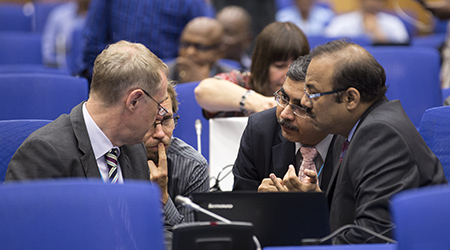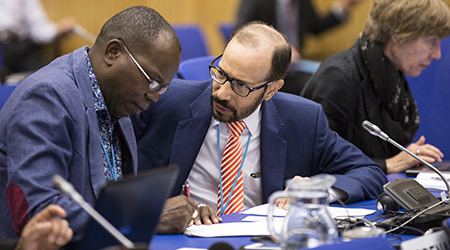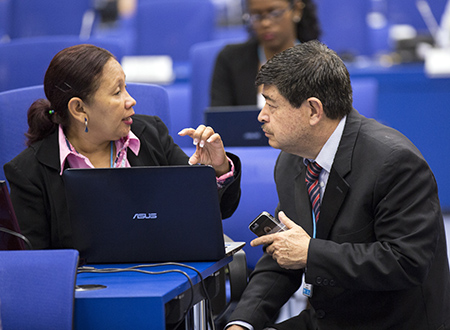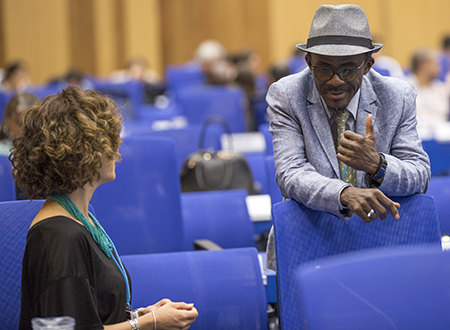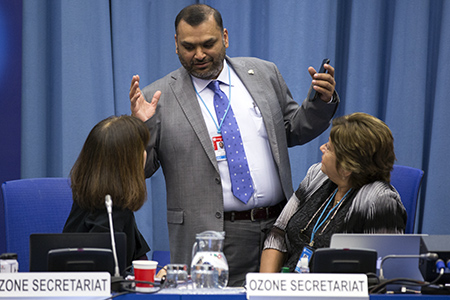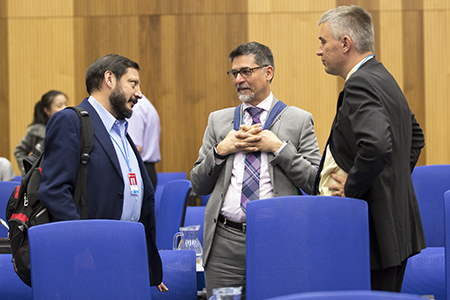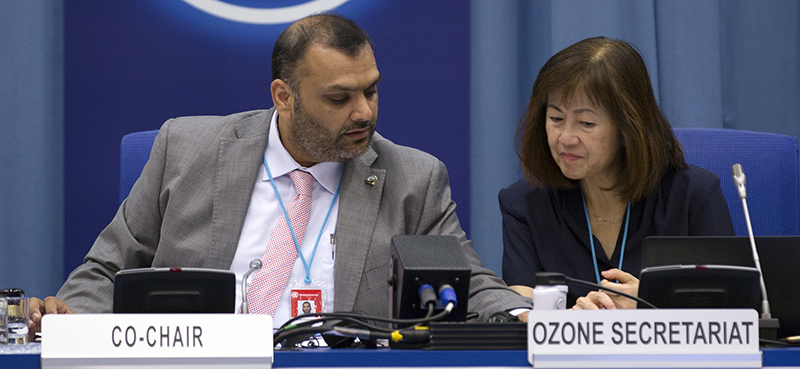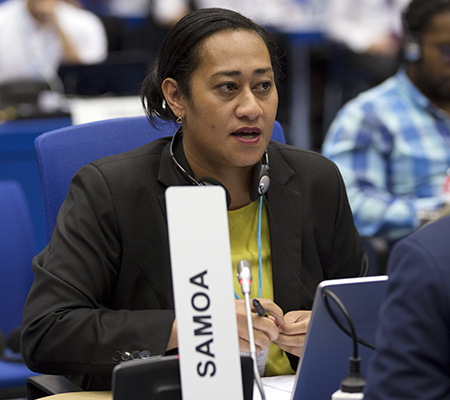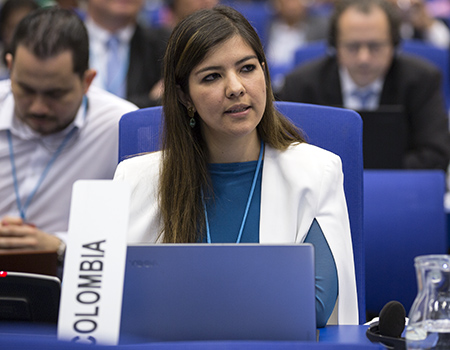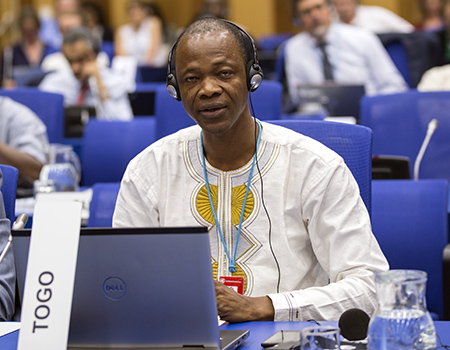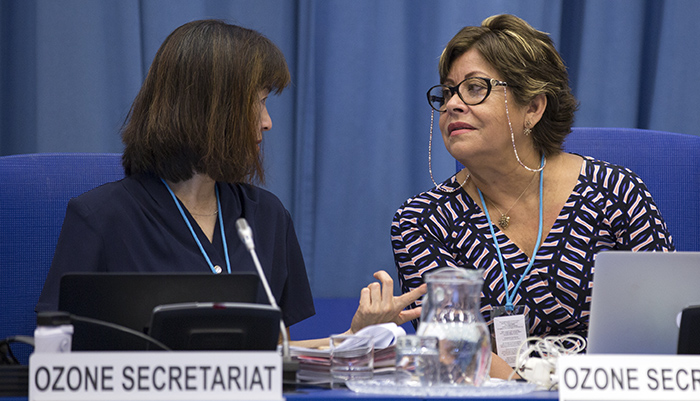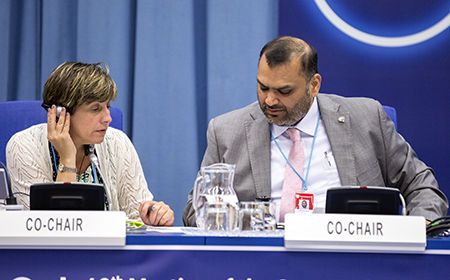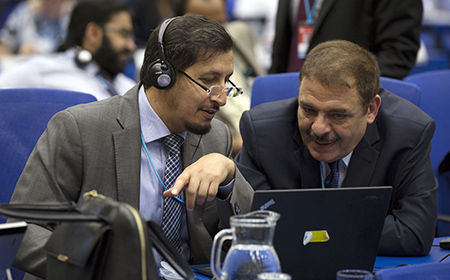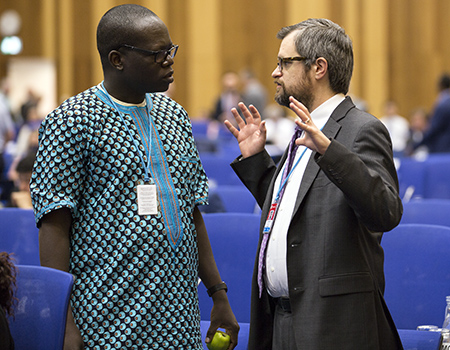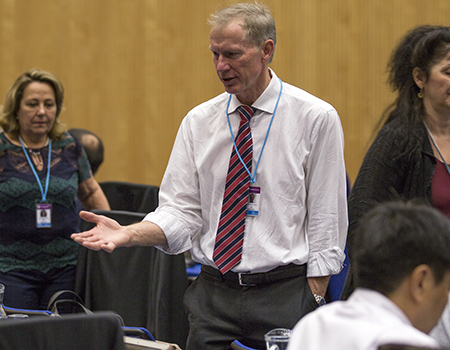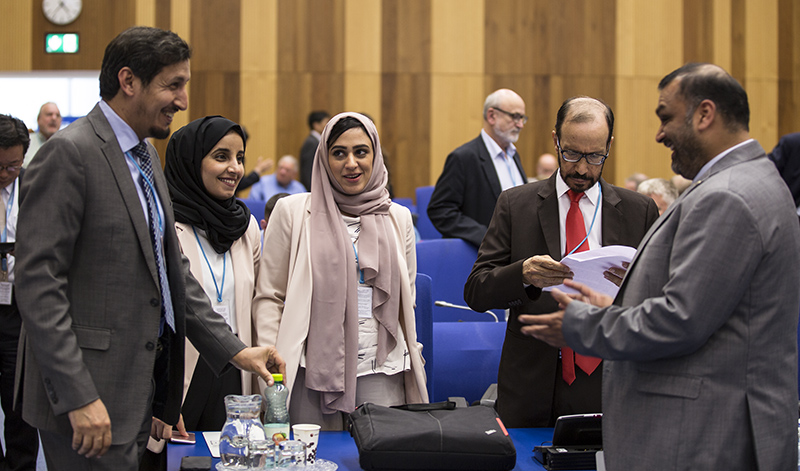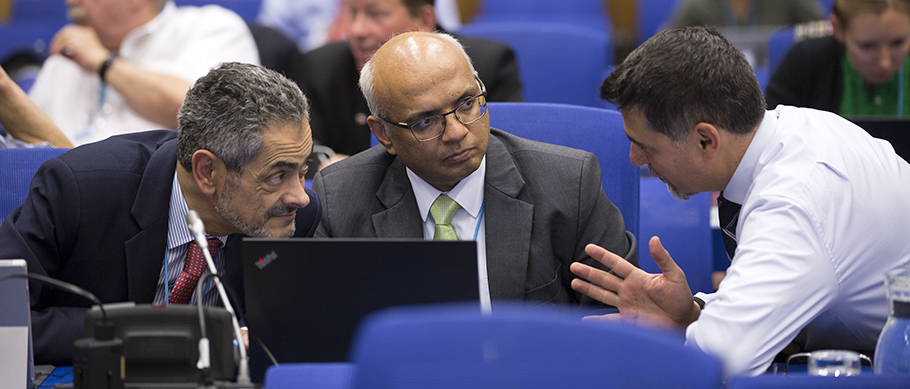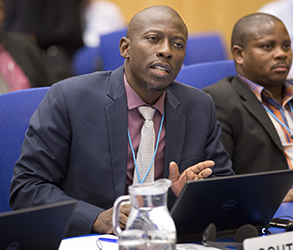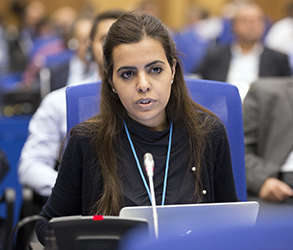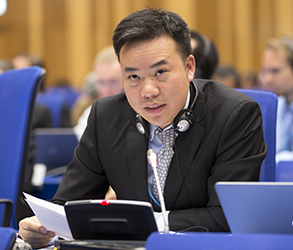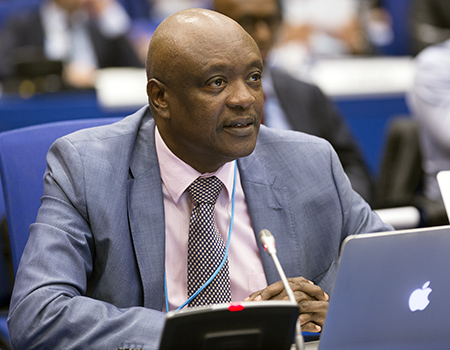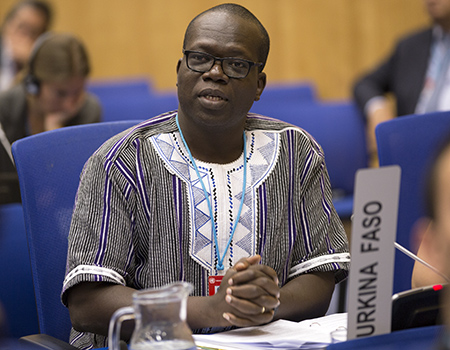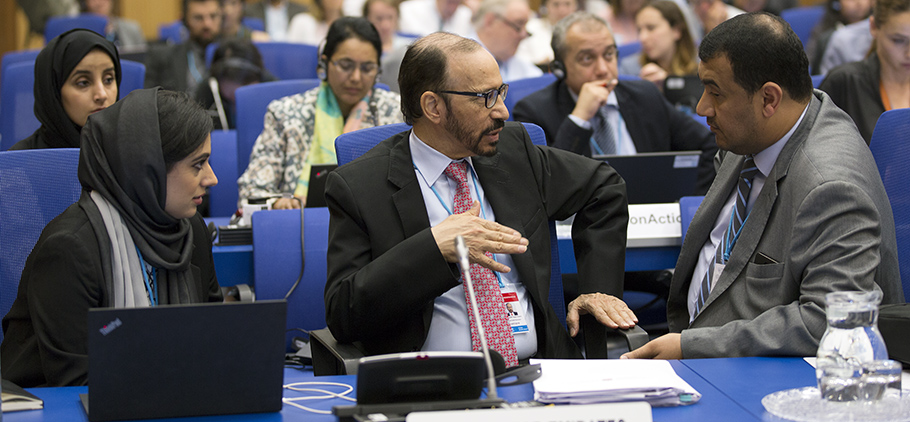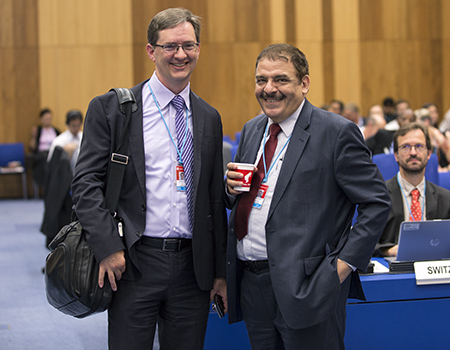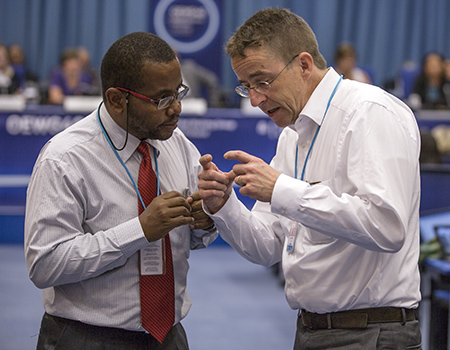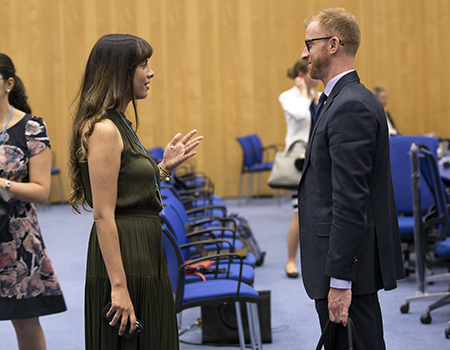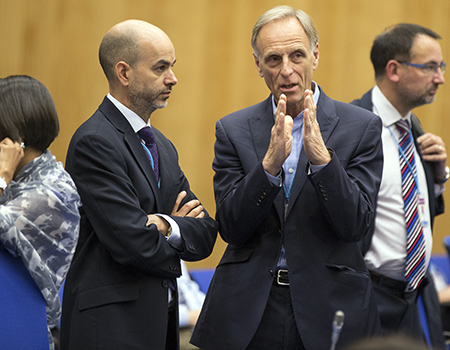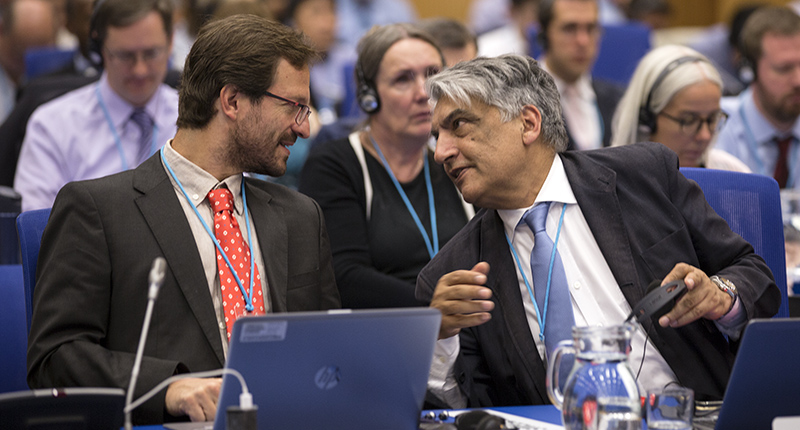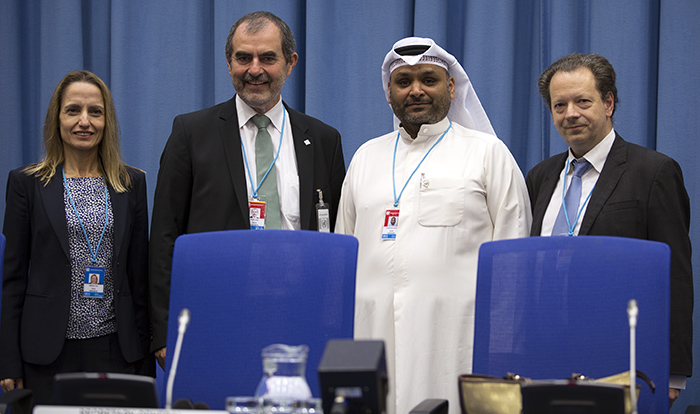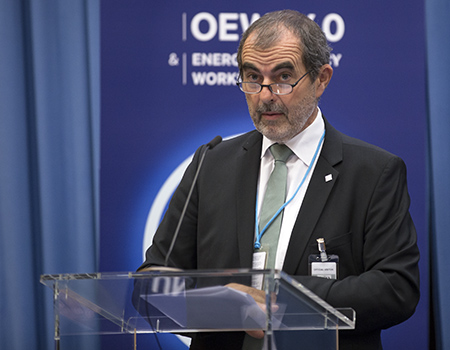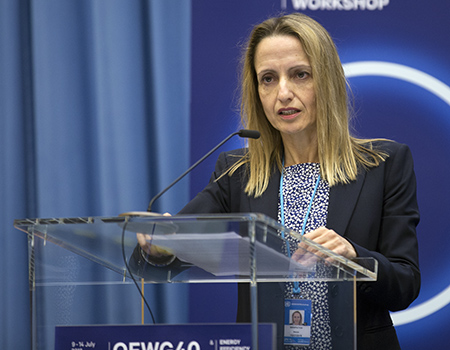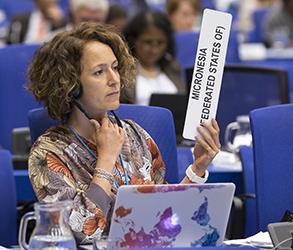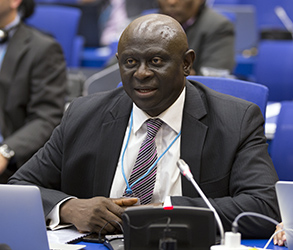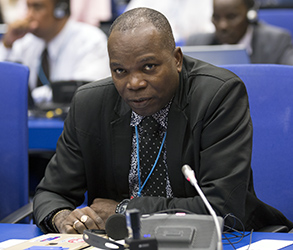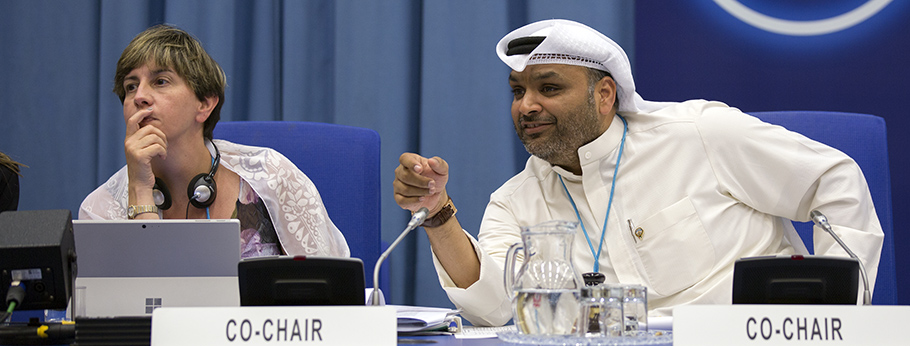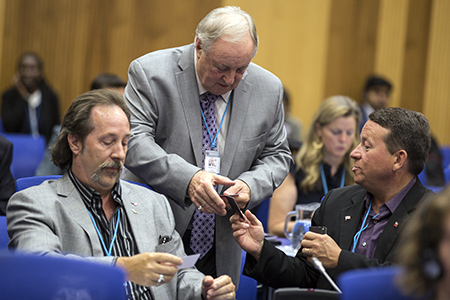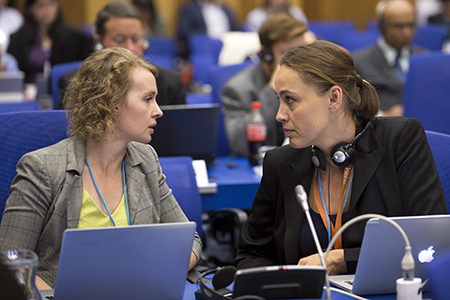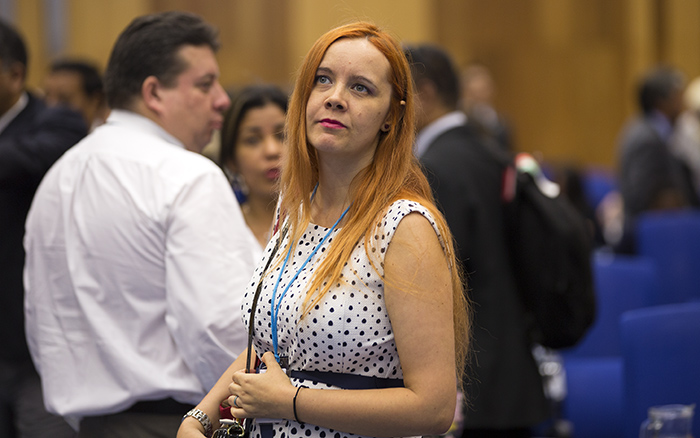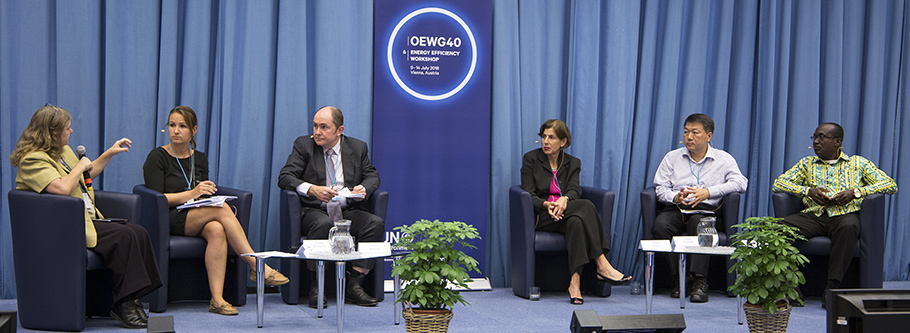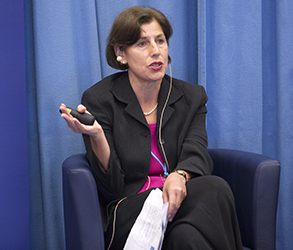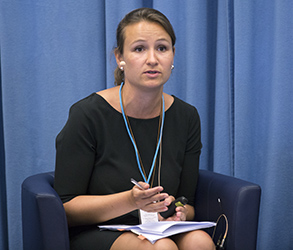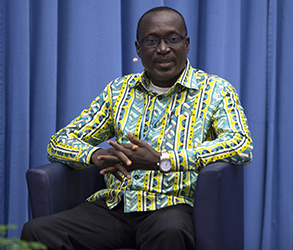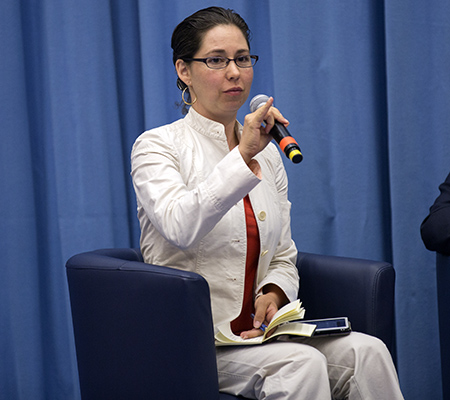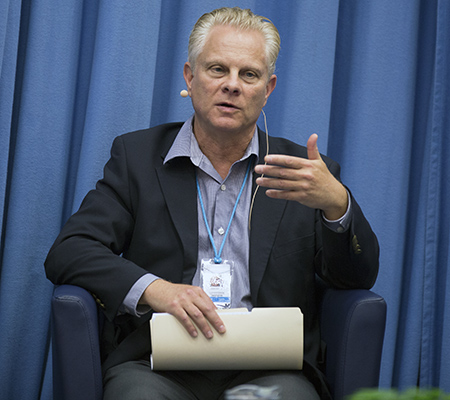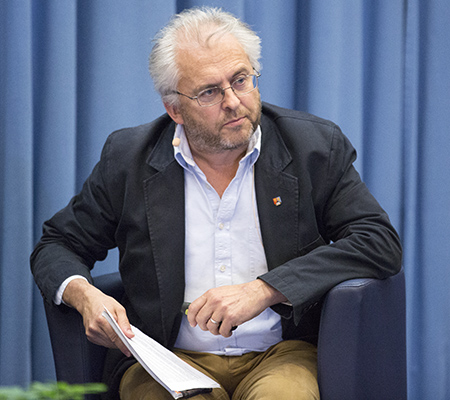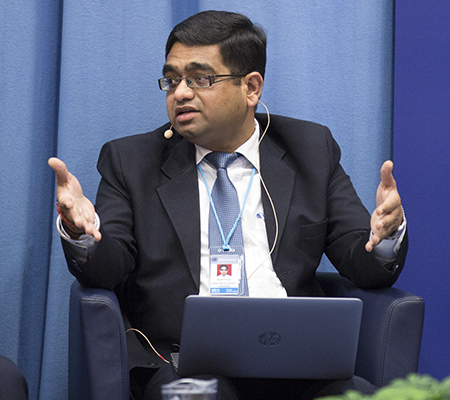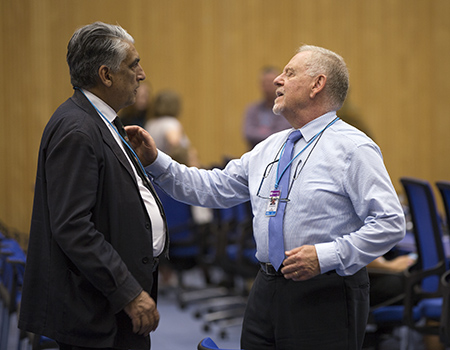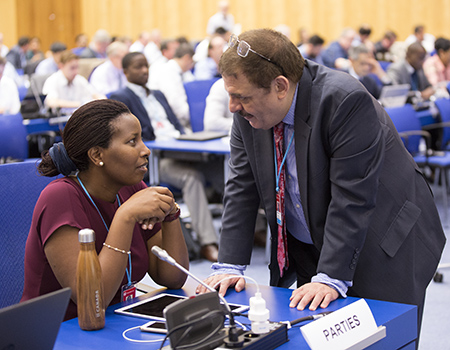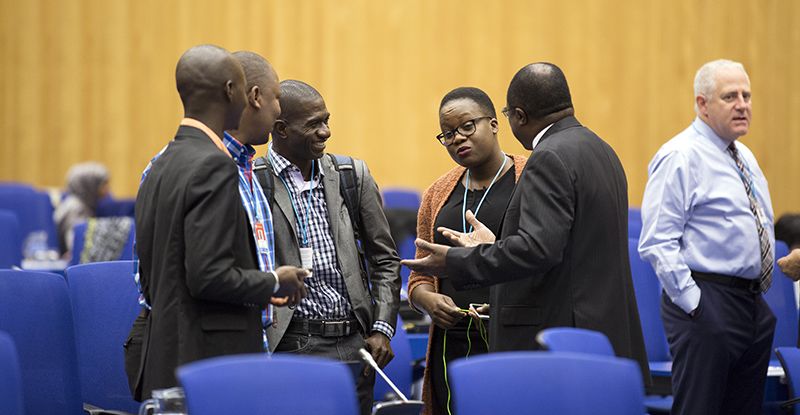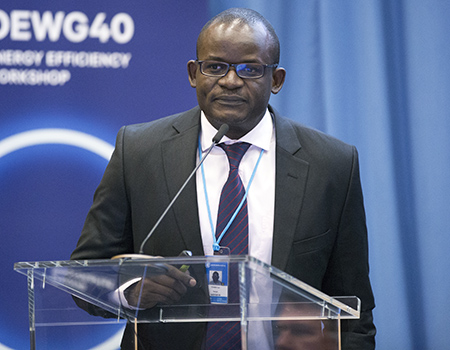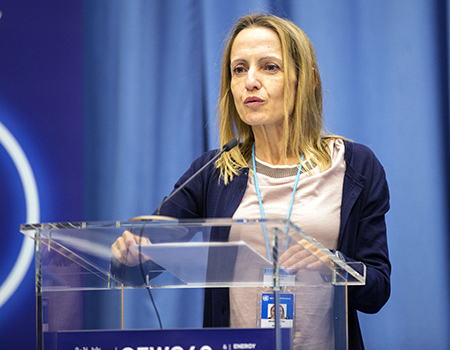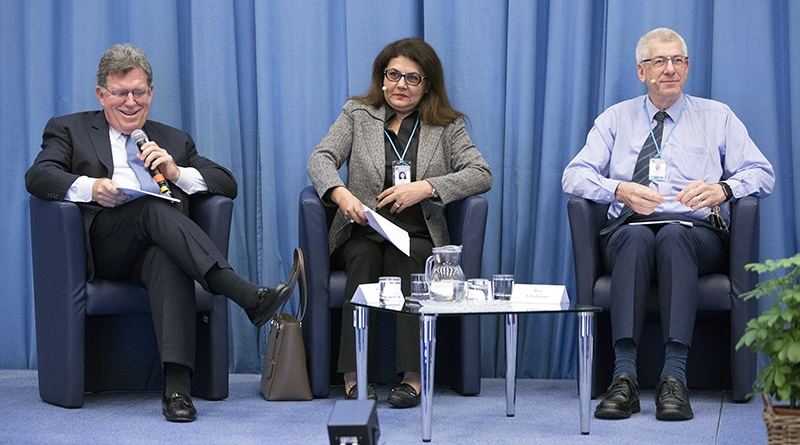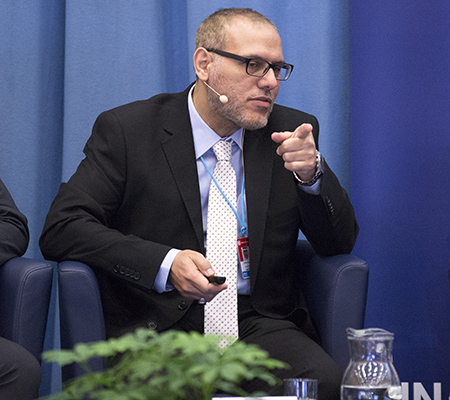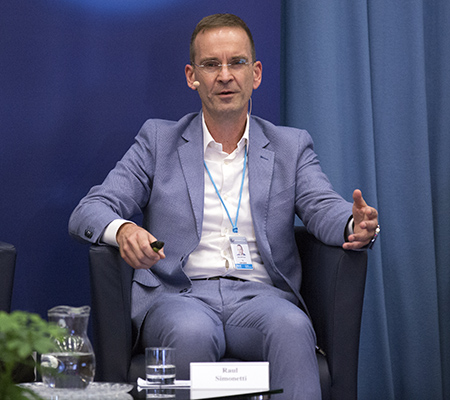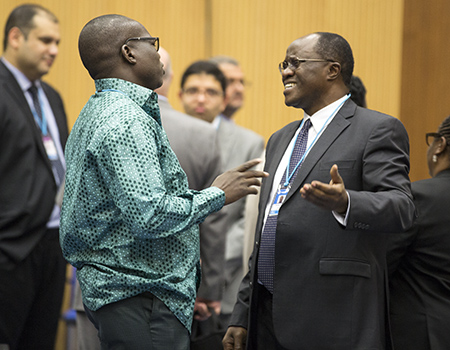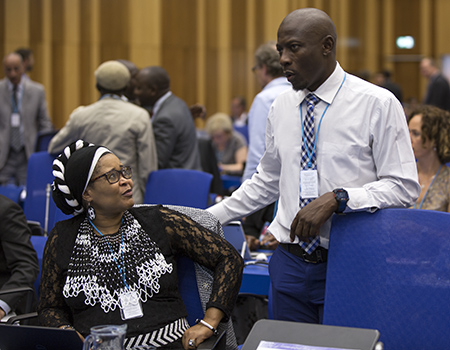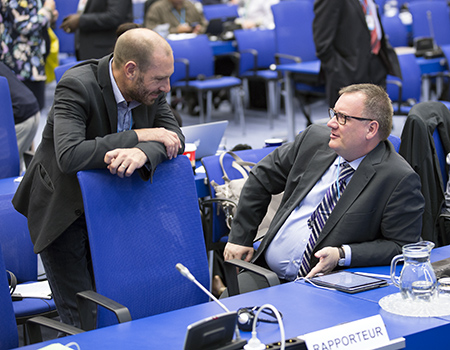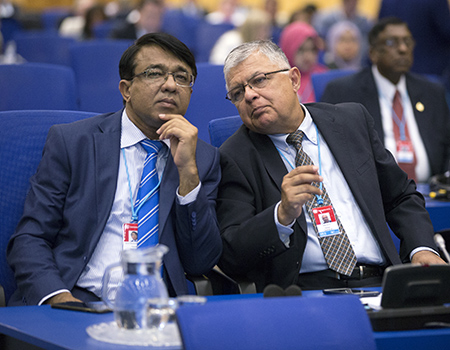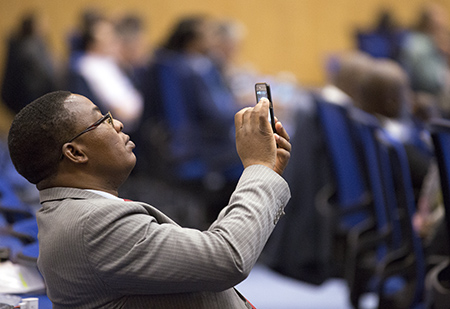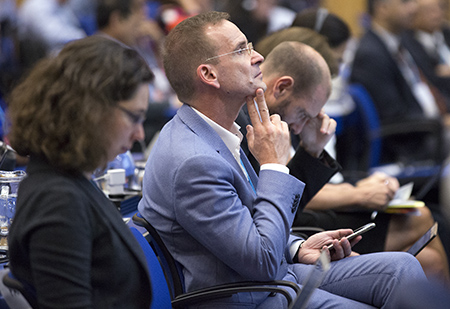Workshop on Energy Efficiency Opportunities While Phasing-Down Hydrofluorocarbons (HFCs) and 40th Meeting of the Open-Ended Working Group of the Parties to the Montreal Protocol on Substances that Deplete the Ozone Layer
9-14 July 2018 | Vienna, Austria
Summary Highlights 9-14 July 2018
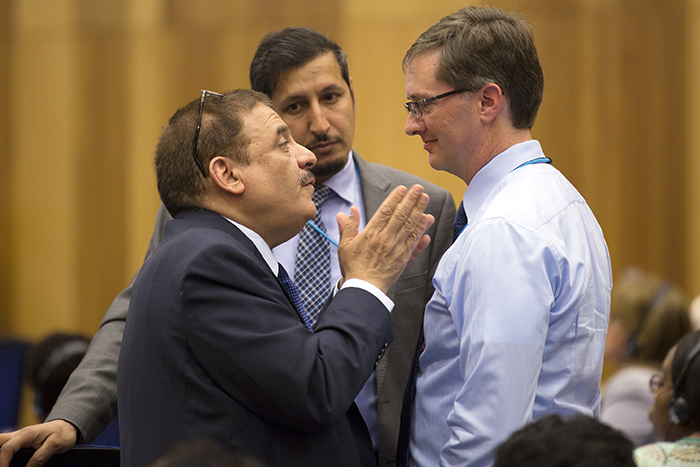
From L-R: Taha Mohammed Zatari, Saudi Arabia; Hamoud Al-Otaibi, Saudi Arabia; and John Thompson, US |
||
|
On Saturday, delegates to the Open-Ended Working Group to the Montreal Protocol on Substances that Deplete the Ozone Layer (OEWG 40) finalized discussions on data reporting, unexpected emissions of trichlorofluoromethane (CFC-11), Technology and Economic Assessment Panel (TEAP) senior expert nominations, energy efficiency, and adjustments to the Protocol. OEWG 40 concluded all its agenda items until the thirtieth Meeting of the Parties to the Montreal Protocol on Substance that Deplete the Ozone Layer (MOP 30) and received submissions of three conference room papers (CRPs) that will be forwarded for consideration by MOP 30 convening in November in Quito, Ecuador. These relate to: unexpected emissions of CFC-11; access of Article 5 parties to energy-efficient technologies in the refrigeration, air-conditioning and heat-pump sectors; and addressing the composition and balance of the assessment panels. Other highlights of the day included:
After adopting the report of the meeting and hearing closing statements, OEWG 40 closed at 10:40 pm. |
||
|
IISD Reporting Services, through its Earth Negotiations Bulletin (ENB) Meeting Coverage, has providing daily digital coverage and a summary and analysis from OEWG 40. Photos by IISD/ENB | Mike Muzurakis + Visit the web coverage for Saturday, 14 July 2018 | ||
Highlights for Saturday, 14 July 2018
|
|
|
|
|
|
|
|
|
|
|
|
|
|
|
Highlights for Friday, 13 July 2018
|
|
Delegates to the fortieth meeting of the Open-Ended Working Group to the Montreal Protocol on Substances that Deplete the Ozone Layer (OEWG 40) continued their deliberations on Friday, considering the following agenda items:
Informal consultations took place throughout the day, and several contact groups convened into the evening, where delegates discussed:
|
||
|
+ Visit the web coverage for Friday, 13 July 2018 | ||
|
|
|
|
|
|
|
|
|
|
|
Highlights for Thursday, 12 July 2018
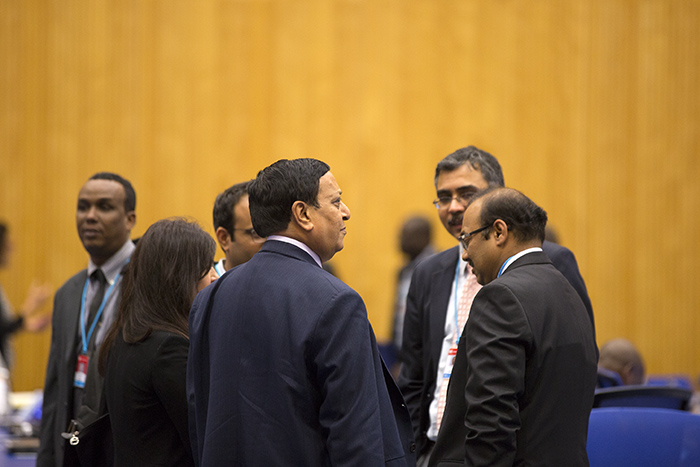
Delegates from India during the lunch break |
||
|
Delegates to the fortieth meeting of the Open-Ended Working Group to the Montreal Protocol on Substances that Deplete the Ozone Layer (OEWG 40) continued their deliberations on Thursday, considering the following agenda items:
Some of these discussions continued in informal consultations in the evening. Two contact groups, tasked to reach agreement on details needed for the implementation of the Kigali Amendment, met throughout the day, focusing on clarifying data reporting issues and approving destruction technologies for HFCs. A third contact group, on linkages between HCFCs and HFCs in transitioning to low global warming potential (GWP) alternatives, met in the evening. |
||
|
+ Visit the web coverage for Thursday, 12 July 2018 | ||
|
|
|
|
|
|
|
|
|
|
|
|
Highlights for Wednesday, 11 July 2018
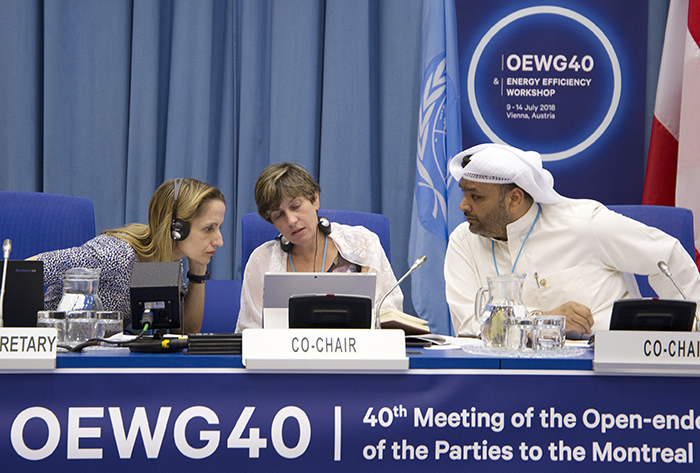
Ozone Secretariat Executive Secretary Tina Birmpili; OEWG 40 Co-Chair Cindy Newberg, US; and OEWG 40 Co-Chair Yaqoub Al-Matouq, Kuwait |
||
|
The fortieth meeting of the Open-Ended Working Group to the Montreal Protocol on Substances that Deplete the Ozone Layer (OEWG 40) opened Wednesday, 11 July 2018, in Vienna, Austria. In their opening remarks, Josef Plank, Ministry of Sustainability and Tourism, Austria, and Ozone Secretariat Executive Secretary Tina Birmpili cited recent findings of global emission increases of the ozone depleting substance trichlorofluoromethane (CFC-11). They called on delegates to address the issue, with Executive Secretary Birmpili reminding: “We have an obligation to use the institutions of the regime that we have created - this is how the treaty works.“ Discussions during the day focused on sharing views on:
Highlights of the day included:
Several parties expressed concern about the unexpected and persistent increase in CFC-11 emissions and welcomed that the meeting will provide early time to discuss this new agenda item. They referred to an Article published in the Journal Nature on 16 May 2018, that revealed CFC-11 emissions increased significantly despite the reported elimination of CFC-11 production under the Montreal Protocol. This suggests new unreported CFC-11 production, when the existence of any new CFC-11 production would violate the Protocol obligation to eliminate production of CFCs by 2010. An apparent inconsistency emerges because the production of CFC-11 for dispersive uses has been phased out globally under the Protocol and the production reported to the Ozone Secretariat since 2010 has been very small and for essential uses. Besides alarming concern, the Report delivered by the COP and MOP presidents to the HLPF 2018 explained that these findings also highlight the efficacy of the Montreal Protocol with science at their core stressing that “so long as scientists remain vigilant, new production or emission of ozone depleting chemicals will not go unnoticed.” Executive Secretary Birmpili reminded OEWG 40 that the Ozone Research Managers Report at COP 11/MOP 29 urged continued monitoring of ozone as well as ozone-depleting substances, and, that such activities require funding. |
||
|
+ Visit the web coverage for Wednesday, 11 July 2018 | ||
|
|
|
|
|
|
|
|
|
|
Highlights for Tuesday, 10 July 2018

The Vienna International Centre |
||
|
The workshop on Energy Efficiency Opportunities While Phasing-Down Hydrofluorocarbons (HFCs) continued and concluded on Tuesday, 10 July 2018, at the United Nations Office in Vienna, Austria. Participants heard presentations and engaged in discussions during two sessions on:
In the afternoon, the workshop rapporteurs summarized key messages from their respective sessions. These include:
The conclusions of the workshop will be presented to the 40th Meeting of the Open-Ended Working Group (OEWG 40), which opens on Wednesday, 11 July. As Ozone Secretariat Executive Secretary Tina Birmpili explained, "energy efficiency is relatively new to the process and it is up to parties to decide on how to take this matter forward." OEWG 40 will also consider the 2018 Technology and Economic Assessment Panel (TEAP) report, including a task force report specifically on issues related to energy efficiency while phasing down HFCs. |
||
|
+ Visit the web coverage for Tuesday, 10 July 2018 | ||
|
|
|
|
|
|
|
|
|
|
|
Highlights for Monday, 9 July 2018

Gunter Fischer, European Investment Bank Group, discussing with fellow panelists |
||
|
The two-day Workshop on Energy Efficiency Opportunities While Phasing-Down Hydrofluorocarbons (HFCs) opened on Monday, 9 July 2018, at the United Nations Office in Vienna, Austria.
Day one of the workshop was divided into sessions that discussed:
The workshop continues Tuesday, 10 July 2018, and its conclusions will be presented to OEWG 40 for further consideration. |
||
|
+ Visit the web coverage for Monday, 9 July 2018 | ||
|
|
|
|
|
|
|
|
|
|
|
|
IISD Reporting Services is grateful to the many donors of the Earth Negotiations Bulletin (ENB) and recognizes the following as core contributors to the ENB: the European Union and the Kingdom of Saudi Arabia. General Support for the Bulletin during 2018 is provided by the German Federal Ministry for the Environment, Nature Conservation and Nuclear Safety (BMU), the Italian Ministry for the Environment, Land and Sea, the Japanese Ministry of Environment (through the Institute for Global Environmental Strategies - IGES), the New Zealand Ministry of Foreign Affairs and Trade, the Swedish Ministry of Foreign Affairs, the Government of Switzerland (Swiss Federal Office for the Environment (FOEN)), and SWAN International. Funding for translation of the Bulletin into French has been provided by the Government of France, Québec, the Wallonia, and the Institute of La Francophonie for Sustainable Development (IFDD), a subsidiary body of the International Organization of La Francophonie (OIF). |
||



